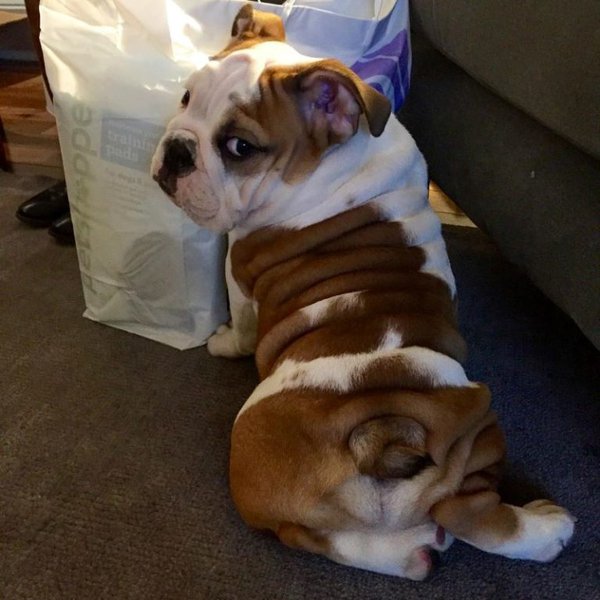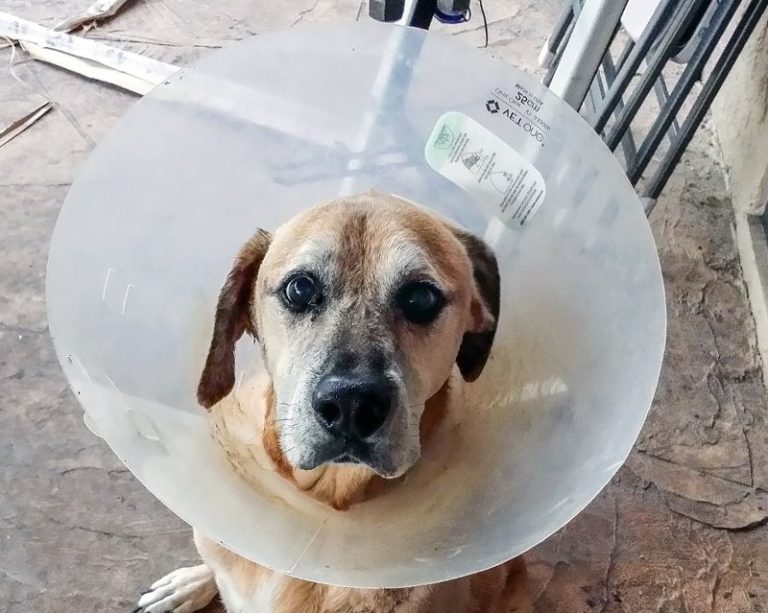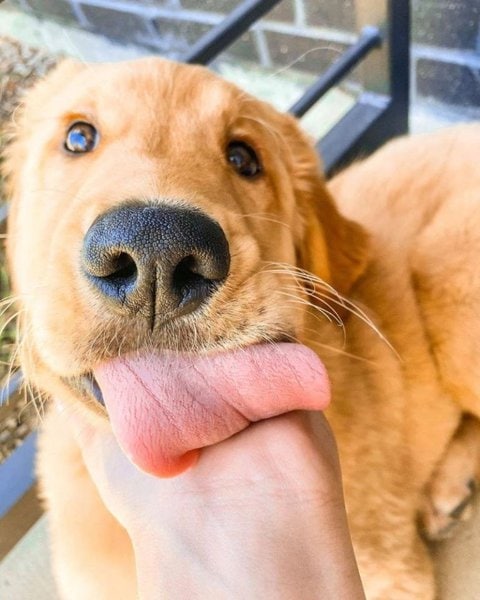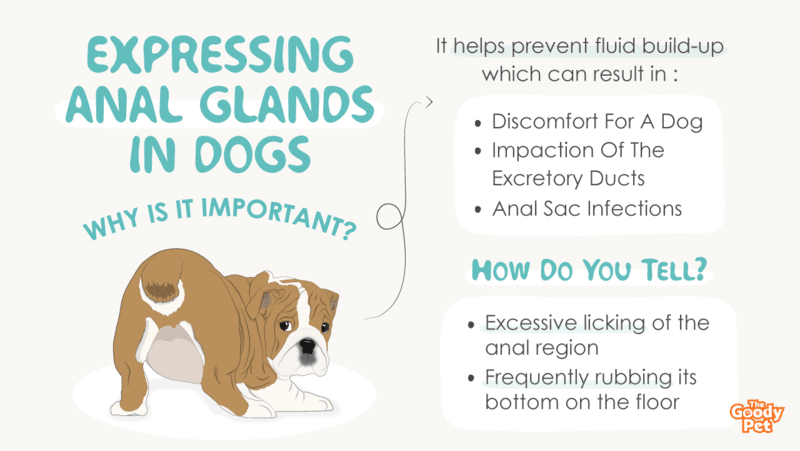Whether you’ve seen them before or not, the truth is, all dogs have these pea-sized anal glands that give off the stinky odor peculiar to dogs. However, regardless of the nature of their function in a dog’s body, these glands need considerable attention, and we’ll see the reasons for this shortly. So then, why is it important for a dog’s anal glands to be regularly expressed?
Regular expression of a dog’s anal glands is important as it helps prevent fluid build-up which can result in great discomfort for a dog, impaction and blockage of the pooch’s excretory ducts, and the development of skin infections.
That said, a dog’s physical anatomy is such that its anal glands are designed to naturally get rid of fluid when the dog defecates, hence you may not need to get involved with expressing these glands. However, for certain reasons, some dogs are unable to express their anal glands, and this typically results in toxic fluid build-up that has to be eliminated.
Information on when to step in and manually express your dog’s anal glands, as well as the steps to take to express a dog’s impacted anal glands are all outlined in today’s article. But before we go further, let’s see why it is important to express a dog’s anal glands, as well as the consequences of a dog failing to express its anal glands.
Why Is It Important To Express A Dog’s Glands?
Dogs need to have their anal glands regularly expressed to prevent the occurrence of anal sac infections caused by retention of the sac fluid.

Anal Sac Disease Prevention
Fluid stored in a dog’s anal sac is an ideal breeding ground for various bacteria and infections. And if, for one reason or the other, a dog is unable to express its sac, and subsequently get rid of such fluid, the pooch’s chances of contracting an infection of the anal sac will be significantly higher.
Some of the factors that may result in the inability of a dog to express its anal glands include:
- Allergic reactions due to food, its skin or the environment
- Being overweight
- Skin mite infestations
- Anal gland tumor
- Diarrhea, and among others
Occasionally, dogs may be unable to express their anal glands suffer fluid-build up within their anal sac. And over time, the retained fluid thickens and can cause both great pain and discomfort to the dog.
What Is The Importance Of Anal Glands To Dogs?
Now that we know why it is important for a dog’s anal gland to be expressed, either naturally or manually, why do dogs need these glands in the first place?
Typically, wild dogs make use of these anal glands to release scent to mark territory or ward off hostile animals. However, these behaviors aren’t as common among domesticated dogs.
Hence, the function of anal glands in domestic dogs is limited to the releasing of a unique scent that is used for communication with other pooches – which is done by sniffing each other’s rear region.
In addition, the fluid contained in dogs’ anal glands is responsible for the offensive smell of dog stool that is perceived whenever a pooch defecates.
Do All Dogs Need Anal Glands Expressed?

No, not all dogs need their anal glands expressed.
The fluid contained in most dogs’ anal glands automatically empties out every time the dog defecates, thereby making manual expression to get rid of the fluid unnecessary.
That said, canine anal glands should only be manually expressed when absolutely necessary, such as in the case of the pooch’s inability to naturally get rid of the sac fluid or an infection of the anal sac.
Frequently expressing a dog’s anal glands without cause can result in irritation and damage of the sac tissues, and this can, in turn, lead to medical emergencies such as a blockage of the pooch’s drainage duct.
What Dog Breeds Need Their Glands Expressed?
Anal gland expression isn’t limited to breed, and it is very possible for all dog breeds to have issues with their anal glands.
That said, it has been noticed that small dog breeds, such as Chihuahua, Beagle and Toy Poodle are more prone to suffering anal sac diseases from impacted glands, compared to their larger counterparts, and this can be due to several reasons.
Firstly, smaller dogs are more prone to suffering from weight issues, compared to the large dogs, and this alone places these pooches at a higher risk of suffering from impacted anal glands.
In addition, small dogs tend to be less active than large dogs, and this means that muscles located in such dogs’ rumps may not be strong enough for natural expression of the glands.
How Do You Tell If Your Dog Needs His Glands Expressed?
You can tell that your dog needs its anal glands expressed if you notice behavior such as excessive licking of the anal region or the pooch frequently rubbing its bottom on the floor.
In addition, the presence of a pungent odor from a pooch’s anal region or a brownish residue left where a dog was previously sitting are also indicators that the pooch’s anal gland need expressing.
Most dogs typically don’t need their glands manually expressed on a regular basis, and it is even possible for a dog to live its entire life without needing assistance to express its glands!
Consequently, this is why it is important to pay attention to the signs exhibited by a pooch when its glands are at maximum capacity, so that the necessary measures can be put in place to assist the dog with massaging the glands to prevent medical complications.

Monitor The Dog’s Weight
If a dog is overweight, chances are that such a pooch will need assistance in expressing its glands. Deposits of fat typically found in obese dogs may accumulate around the pooch’s anus, thereby making it difficult for such a pooch to lick and massage the glands to relieve fluid build-up.
Is Your Dog Dragging Its Butt Across The Ground?
Butt dragging or scooting is a way for pooches to relieve pressure due to fluid build-up in their anal glands, and this is one sure-fire way of telling that a dog needs to have its glands manually expressed.
Can Dogs Express Their Own Glands By Licking?

No, the anatomy of canine anal glands is such that a dog can’t express its own glands by mere licking.
Dogs Lick Anal Glands To Relieve Pain
The natural way for a dog’s anal gland to be expressed is for fluid contained in the sacs to be ejected whenever the dog defecates. However, failure of the sac fluid to be ejected with stool causes inflammation, which typically results in great discomfort for the pooch, and this is when the dog can be observed licking its glands in a bid to relieve the pain.
As A Self-Grooming Measure
Fluid build-up in the anal glands typically results in some of the fluid leaking out, and a pooch may lick that region to carry out self-grooming and keep its anal region clean.
Licking Can Be An Indicator Of Other Medical Issues
A dog licking its rear region doesn’t necessarily mean it’s attempting to express its anal glands, and this licking can also be a sign of other problems such as skin allergies, skin infection or the presence of parasites, among others.
To be certain that your pooch’s licking isn’t due to an issue with its anal glands, you should watch out for signs peculiar to the aforementioned medical conditions.
How Can I Express My Dog’s Glands?
You can empty your dog’s anal glands at home by massaging the anal sacs to get rid of excess fluid build-up that is causing discomfort to your furry friend.
Manually expressing a dog’s anal glands can be an unpleasant experience, due to the waste fluid that you potentially have to deal with, and this is why a lot of people leave this task to the professionals. However, with the right knowledge, appropriate equipment, and a little bit of courage, expression of a dog’s anal glands can be done right at the comfort of your home.
That said, here are the steps to take to naturally express your dog’s anal glands without having to visit the vet:
Collecting Supplies
Some of the supplies you’ll need to massage and express your dog’s anal glands at home include medical gloves, lube, paper towels, and a muzzle, provided the pooch is averse to being handled and examined.
Expressing The Glands
- Expressing inflamed anal glands can be an uncomfortable experience for your pooch. Hence, it is advisable that you have someone at hand to help keep the dog steady, while you attempt to get rid of excess fluid in the pooch’s sacs.
- Once you’ve succeeded in keeping the pooch steady, apply lube to your gloved fingers, and gently insert your finger into the dog’s anus.
- Feel around for the pea-sized glands typically located near the pooch’s anus, and gently massage the sacs to get rid of retained fluid.
- Carry out the process described above on both sacs, and wipe off remnants of the sac fluid with paper towels.
If your dog seems to be in too much pain while you’re expressing its anal glands, we recommend that you take such a pooch to the vet for a proper medical check-up.
In addition, if you notice redness and inflammation of the anal sacs, as well as the presence of open sores, an infection may be at play, and we recommend leaving the expression to your vet in this case.
NOTE: There is no need to express your dog’s anal glands, if the pooch isn’t showing signs of fluid build-up in the sacs; Regular anal gland expression without reason will only result in inflammation and injury, and the glands will also become dependent on these regular massages to function properly.
How To Prevent Issues With Your Dog’s Anal Glands?
It is said that prevention is better than cure, and by taking certain measures to maintain your pooch’s health, you can significantly lessen your chances of dealing with anal gland issues. Here are the ways by which you can prevent issues with your dog’s anal glands include:
Watching The Dog’s Weight
As stated earlier, obese dogs are quite prone to suffering from an impacted anal gland, and to prevent this from happening, it is important that you keep your dog’s weight at an ideal level.
Feeding A Fiber-Rich Diet
Fiber is quite effective at preventing anal gland issues in dogs by bulking up stool, thereby making expression of the anal glands easier. And by incorporating fiber-rich food substances such as green beans, canned pumpkin and fiber supplements into your pooch’s meals, you can help firm up stool and prevent issues with expressing anal glands.
Exercising Regularly
The benefits of regularly engaging your pooch in exercise activities can’t be stated enough. And one of these such benefits of regular exercising is the firming up of the dog’s anal muscles which makes expression of the anal glands easier.
Minimizing Your Dog’s Exposure To Allergens
Allergies are a common cause of impacted anal glands in dogs. And by working with your vet to get familiar with substances your pooch is allergic to, and subsequently reducing the dog’s exposure to such substances, you can help prevent the occurrence of anal gland problems.
How Much Does It Cost To Express Dog Glands?
The cost to get a dog’s anal glands manually expressed by a vet typically ranges between $25 to $40, but this is largely dependent on the vet’s location, as well as the severity of the condition.
Chronic anal gland issues may require surgery for complete removal of the affected glands. And in this case, the cost will be considerably higher than what is obtainable with regular expression, and you should be prepared to incur costs running into hundreds or thousands of dollars.
Expression of a dog’s anal glands carried out during a routine medical check-up will also cost significantly less than what you will pay for a medical appointment specifically booked to get your pooch’s sacs massaged, as you will have to pay a consultation fee to the vet.
Most professional groomers have also been trained to express a dog’s anal glands whenever the pooch is brought in for grooming, although manually expressing an otherwise healthy anal gland isn’t recommended for reasons earlier stated.





